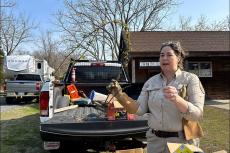The contempt hearing in which property owners along the 4,000-foot stretch of Napeague oceanfront popularly known as Truck Beach claimed that East Hampton Town failed to comply with last February’s New York State Supreme Court Appellate Division determination that residents have no inherent right to drive and park vehicles there concluded two weeks ago with testimony by two town employees and two property owners.
Supplemental submissions in the contempt hearing are due by Monday, after which Justice Paul J. Baisley Jr. is to issue a decision, though James Catterson, an attorney for the property owners, asked the judge at the conclusion of testimony in State Supreme Court in Riverhead if he could instead submit a letter detailing “our contentions” and “an extremely brief” review of the evidence. Christopher McDonald, outside counsel for the town, concurred, and the judge granted the request.
Mr. Catterson and Stephen Angel, also representing the plaintiffs, repeatedly tried to portray a concerted effort by town officials to stall and otherwise fail to take measures to enforce a prohibition of vehicles on the beach in question, following the February 2021 ruling overturning a previous decision that an 1882 deed reserved the public’s right to access the beach. In particular, the plaintiffs’ attorneys complained to Justice Baisley that the town has not complied in producing officials’ electronic communications, including text messages and emails.
A June injunction reiterated the Appellate Division’s February 2021 affirmation that the property owners do, in fact, own the beach. The town, according to that injunction, must comply with the February ruling and revoke “any and all permits issued by the town for the 2021 season that do not expressly prohibit driving or parking” on that beach.
From the witness stand, Ed Michels, the town’s chief harbormaster, told Mr. Catterson that he did not receive official notification of the February 2021 decision until June. He had stationed a vehicle at the eastern end of Marine Boulevard, where there is a vehicle access point to the beach, he said, and discussed how that access could be blocked with officials from the town’s Parks and Recreation Department.
“I gave everybody a rundown as to how we would handle private property trespass if it happened,” he said. Were his instructions to prevent people from entering the beach, Mr. Catterson asked. “No,” was the reply.
Mr. Catterson asked him to read a passage from the injunction including a directive that the town is ordered to prevent driving and parking on the beach. “What steps did you take?” he asked.
The best he could do, Mr. Michels said, was block access at Marine Boulevard and advise people of the directive. But there were no procedures in place “to physically stop anyone from going anywhere.” He had neither the resources nor the manpower to do that, he said, and he told that to Supervisor Peter Van Scoyoc’s chief of staff.
“What did they tell you?” he was asked.
“ ‘I’ll get back to you,’ ” was the reply.
“Did they?”
“No.”
Mr. Catterson was scornful of the string fence erected on the beach at the Napeague Lane road end to demarcate the portion the Appellate Division had deemed private. “Fence” was a generous description, he said. “Would you agree that it is truck-proof” or adequate to comply with the court’s order, he asked Mr. Michels. No, was the reply.
Kenneth Silverman, president of one of the homeowners associations, who later testified via video conference, was not happy with the string fence either, Mr. Michels said. He said that he told Mr. Silverman to direct his complaint to Town Hall. “We had to stay out of that business of making policy,” he said.
Mr. Michels was aware that commercial fishermen were planning an act of civil disobedience several weeks before the June 27 protest, during which almost 40 vehicles drove across the 4,000-foot stretch of beach before turning around and returning. Danny Lester, one of the protesters, had informed him directly, he said.
“I said go ahead, as long as you stay below mean high water,” he told Mr. Lester. Did the caravan remain below the mean high water mark, Mr. Catterson asked. “In my judgment, they did,” Mr. Michels said. “We felt it was a quick way for them to exercise their constitutional right.”
At a second protest, on Oct. 17, Mr. Michels said, Mr. Lester told him that fishermen wanted to be cited for trespassing and asked what they would have to do to accomplish that goal. “I said to drive above mean high water or park on the beach,” he said. He took no steps to prevent the trucks from accessing the beach because there was no way to do so, he said. “Trying to keep this under control” was his primary concern at the protest, when 14 were cited for trespassing.
“Did you feel forced to write those summonses?” Mr. Catterson asked.
“Not at all,” Mr. Michels said. It was his own decision to proceed as he did, he said.
During questioning by Mr. McDonald, Mr. Michels said he had never been directed not to enforce an act of trespass, nor had any plaintiff made an official complaint. On cross-examination, Mr. Catterson asked if anyone had affirmatively told him to enforce the injunction. “Not in those words,” he said. It is his department’s standard procedure that someone must file a trespassing complaint in order to enforce the injunction, he said.
Upon the conclusion of Mr. Michels’s testimony, Mr. Catterson emphatically complained about “a continuing pattern throughout this case” of the town “failing to comply with subpoenas” by turning over communications. “At some point,” he told Justice Baisley, “it falls on you to draw an inference” from what he characterized as noncompliance.
Mr. McDonald disagreed, telling the judge that the town had produced all required text messages.
Justice Baisley seemed sympathetic to the plaintiffs throughout Mr. Michels’s testimony and that of Stephen Lynch, the superintendent of highways, who was only briefly questioned. Mr. McDonald’s objections were usually overruled and Mr. Catterson’s sustained.
Mr. Silverman, who was in Key West, Fla., said that he occupies his Marine Boulevard, Amagansett, house for around five months per year. A sign initially posted at the beach access at the end of Marine Boulevard, stating that vehicle access was only for fishing and fishing-related purposes, had been erected on May 28, he said, the start of Memorial Day weekend and months after the Appellate Division’s decision. He said that he had asked the town officials installing it “whether they really wanted to put that sign up,” and was told that the wording “came directly from” Councilman David Lys.
Around two weeks later, the sign was replaced with another one stating “per court order no vehicles beyond this point until further notice.” That sign remains, as does another declaring that the property is private.
Mr. Silverman told Mr. Angel that the protesting fishermen, rather than remaining below the mean high water mark, drove “right in the middle of the sandy part of the beach.”
On cross-examination, Mr. McDonald asked if there is anything in the Appellate Division’s February decision, or an amended judgment issued in April, that required the town to post signs.
“I don’t think they could comply without signs,” Mr. Silverman said. Mr. McDonald repeated the question. “Not directly,” was the answer. Did either require the town to “keep members of the public off your beach?” The town has an obligation to do so, Mr. Silverman said.
“I’m asking you to focus on the Appellate decision and modified judgment,” Mr. McDonald said. “Do those documents require the town to keep people off your beach?”
“I believe they do,” was the answer. Where, he was asked. “I think it’s implied,” Mr. Silverman said.
Mr. McDonald asked if it was fair to say the February decision and modified judgment reserved the public’s right to use the beach for fishing.
“I think a much more narrow interpretation is correct,” Mr. Silverman said.
“So you don’t believe ‘fishing or fishing related’ appear in either the decision or the modified judgment?”
The judge told Mr. Silverman to answer yes or no. “They do appear,” Mr. Silverman said.



